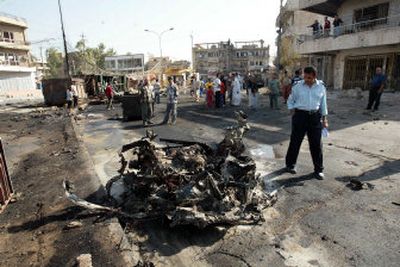Officials plead for end to violence in Iraq

BAGHDAD, Iraq – Iraqi and foreign officials implored the country’s rival factions Wednesday to halt sectarian and political violence, while attacks around Iraq killed at least three dozen people.
Wednesday’s bombings, shootings and kidnappings scarcely approached the carnage of the previous two days, when two attacks south of Baghdad each killed more than 40 people, or the death tolls that last month averaged more than 100 Iraqi civilians a day, according to a U.N. report. The deadliest incident Wednesday was an apparently coordinated small-arms and bomb attack that killed seven people and wounded seven in Baghdad.
Prime Minister Nouri al-Maliki, who has pledged that his three-month-old government will do everything it can to tackle violence and foster reconciliation among Iraqis, said in a news conference that the most recent attacks were intended “to confront the national unity government, because this government’s success means the defeat of al-Qaida.”
Al-Maliki’s efforts to bridge the widening divisions between Iraq’s religious, ethnic and political groups rest largely on what he has called his national reconciliation initiative. He said the initiative was “the only bridge and crossing point through which we can reach the safe shore that unites the sons of the Iraqi people, ends the violent situation, provides stability and puts an end to all discriminatory ideas, whether of sect, political party or race.”
Al-Maliki said he had spoken with the heads of some news organizations and urged them to “stop provoking strife through conducting interviews with those who are provoking it, or adopting emotional statements without considering the common welfare of the Iraqi people.”
President Jalal Talabani, meanwhile, called for Iraq to draft a treaty that would “ban the spilling of Iraqi blood.” And the U.N. special representative for Iraq, Ashraf Qazi, told reporters that “we hope there will be no civil war in Iraq, although the reality right now is that there is a very high degree of violence.”
The human rights office of the U.N. mission in Iraq reported Tuesday that more than 14,000 civilians had been killed during the first half of this year, including more than 3,000 in June.
Wednesday’s violence centered largely in Baghdad. In the deadliest incident, gunmen shot four people in a market and a nearby roadside bomb killed three a few minutes later, the Reuters news agency reported.
Near the campus of Technology University in central Baghdad, a car bomb and two roadside bombs exploded in quick succession between 7:30 and 8 a.m. Maj. Gen. Raad Muhammad of the Interior Ministry initially said the bombs killed 12 people, including five police officers, but later police tallies quoted by news services put the total number of dead at five.
Two rockets landed inside Baghdad’s heavily fortified Green Zone, killing an Iraqi worker and wounding two, the U.S. military said.
In the ethnically mixed city of Kirkuk, 160 miles north of the capital, a bomb tore through a café where the clients werepredominantly elderly people. The explosion killed five people and wounded 16, according to police Lt. Imad Mohammed.